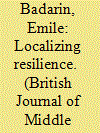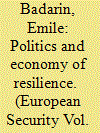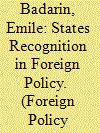| Srl | Item |
| 1 |
ID:
191796


|
|
|
|
|
| Summary/Abstract |
Resilience has become a central notion in the discourse of international foreign aid and development institutions and actors. Although it was often used metaphorically in political realms, extensive theorization of resilience and its appropriation by hegemonic international actors contributes to its conceptual stabilization. Despite the wealth of literature on resilience, the interrogation of the discursive projections and power plays that underpins the concept when it is applied at the local level have been rarely considered. Julian Reid, for example, demonstrated how colonial discourses—in the American, Canadian and Nordic contexts—projected resilience as a trait that is inherent to indigenous peoples’ being and way of life.Footnote1 The aim here, as he observed, is to dominate indigenous imagination and facilitate colonial and neoliberal intrusions. This was echoed by another study that highlighted how resilience is used as part of the settler-colonial and neoliberal structured attack on the resource rights of indigenous people of Australia.Footnote2 These few critical studies reveal a curious process in which power relations are projected under the guise of building and supporting local resilience. It is therefore vital to empirically and critically examine this process to further understand its implications in different contexts.
|
|
|
|
|
|
|
|
|
|
|
|
|
|
|
|
| 2 |
ID:
178614


|
|
|
|
|
| Summary/Abstract |
This article examines empirical resilience interventions to demonstrate how resilience-building is utilised to govern in non-liberal settings and how its political and economic positionality shapes concrete resilience projects, processes of inclusion and exclusion and the hierarchies between them. It argues that the politics and economy that undergird resilience, coupled with the lack of freedom, render empirical resilience less fit for the purpose of governmentality in non-liberal and authoritarian conditions. In these circumstances, resilience-building governs through discipline. Resilience is structurally oriented towards pinpointed interventions directed at specific targets, subjects and fields. It unfolds as a hierarchal and top-down process, which positions local actors and concerns at the bottom. The inclusion or exclusion of subjects, objects and goals and the hierarchies that underpin empirical resilience are not inherent to specific resilience thinking, but rather derive from unfixed and contingent foreign policy rationalities and instruments. This contingency highlights the indeterminate nature of resilience, which opens space for contestation and decoupling. Resilience’s meaning and content are dependent on the dynamics of the foreign policy instruments. The policy-driven nature of resilience intervention renders its theorisation as a difficult challenge.
|
|
|
|
|
|
|
|
|
|
|
|
|
|
|
|
| 3 |
ID:
171781


|
|
|
|
|
| Summary/Abstract |
This article examines politics of states recognition. Despite the significance of the concept of recognition to international politics, only recently has international relations (IR) scholarship begun to appreciate its analytical value. How states employ their prerogatives to grant or withhold recognition has received less attention in IR. The article extends this discussion by shedding light on politics of recognition in contexts of contested states and territorial conflicts. It does so by scrutinizing Sweden's recognition of the Palestinian statehood in October 2014. The findings underline the importance of foreign policy and recognition narratives for explaining and critically evaluating recognition in such contexts; therefore, the analysis of foreign policy needs to be integrated more consistently into the study and theorization of the problem of contested states’ recognition.
|
|
|
|
|
|
|
|
|
|
|
|
|
|
|
|